As a parent or legal guardian, it is important to understand the importance of giving consent for your child’s participation in various activities and events. A parental consent form is a legal document that serves as proof that you, as the parent or guardian, have given permission for your child to participate in a specific activity or event.
This document is often required for school trips, sports teams, volunteer programs, and other extracurricular activities. In this article, we will take a closer look at parental consent forms, including what they are, why they are necessary, and how to properly fill one out. We will also provide a sample form and tips on how to create your own.
Table of Contents
Parental Consent Form Templates
“Parental Consent Form Templates” are pre-designed documents that facilitate the process of obtaining legal authorization from parents or guardians for various activities involving minors. These templates serve as a comprehensive framework to outline the necessary information, permissions, and waivers required to ensure the safety and well-being of the child.
Parental consent forms are essential when minors participate in activities such as field trips, sports events, medical procedures, or educational programs. These forms provide a legally binding agreement between the responsible parties and parents or guardians, establishing clear boundaries and mitigating potential risks.
Parental consent form templates typically include sections to record the child’s personal details, emergency contact information, the specific activity or event involved, and any associated risks or liabilities. They may also include medical release clauses, photo consent provisions, and waivers of liability, depending on the nature of the activity.
When do I need a parental consent form?

A parental consent form is typically required when a child will be participating in activities or events that involve potential risks or hazards, such as field trips, sports, or medical procedures. This form is used to ensure that parents or guardians are aware of the potential risks and have given their consent for their child to participate.
Schools often require parental consent forms for field trips, as well as for the use of certain equipment or participation in certain activities. Sports teams may also require a parental consent form, which usually includes information about the team’s policies and procedures, as well as a waiver of liability.
Medical providers may also require a parental consent form for certain procedures or treatments, such as vaccinations, surgeries, or experimental treatments. This form will include information about the procedure or treatment, any potential risks or side effects, and the parent’s or guardian’s consent for the procedure to be performed.
In other cases, parental consent forms may be required for activities such as overnight camps, travel programs, or volunteer work. It is important for parents and guardians to carefully review the information provided in the form and understand what they are consenting to before signing.
Types of parental consent forms
There are several types of parental consent forms that are commonly used in various settings. These include:
Field trip consent form: This form is used to give permission for a child to participate in a school-sponsored field trip. It typically includes information about the child, the parent or legal guardian giving consent, and the details of the field trip, such as the destination, date, and chaperones.
Photo/video consent form: This form is used to give permission for a child’s photograph or video to be taken and potentially used in school or other organization’s materials, such as yearbook, brochures, or websites. It typically includes information about the child, the parent or legal guardian giving consent, and the specific use of the photograph or video.
Internet and technology consent form: This form is used to give permission for a child to use internet and technology resources provided by the school or organization. It typically includes information about the child, the parent or legal guardian giving consent, and the specific internet and technology resources that the child will be able to access.
Release of information form: This form is used to authorize the release of a child’s personal information, such as school records, to a third party, such as a college or potential employer. It typically includes information about the child, the parent or legal guardian giving consent, and the specific information that is being released.
Passport parental consent form: This form is used to give permission for a child to apply for a passport. It typically includes information about the child, the parent or legal guardian giving consent, and the specific details of the passport application, such as the child’s name, date of birth, and other identifying information.
Child travel consent form: This form is used to give permission for a child to travel without a parent or legal guardian. It typically includes information about the child, the parent or legal guardian giving consent, and the specific details of the travel itinerary, such as the destination, dates of travel, and contact information for the person responsible for the child while traveling.
School parental consent form: This form is used to give permission for a child to participate in school-related activities, such as field trips, extracurricular activities, and special programs. It typically includes information about the child, the parent or legal guardian giving consent, and the specific details of the activity or program.
Child medical consent form: This form is used to give permission for a child to receive medical treatment or procedures. It typically includes information about the child, the parent or legal guardian giving consent, and the specific treatment or procedure that is being authorized, such as medication, surgery, or therapy.
It is worth noting that the specific information and requirements of the parental consent forms may vary depending on the organization or institution issuing them and the laws of the state or country where they are used.
Different types of informed consent
Informed consent is a process by which a person voluntarily confirms their willingness to participate in a particular activity, such as a medical treatment or research study, with full knowledge of the risks and benefits involved. Here are a few different types of informed consent:
Express consent: This type of consent is given verbally or in writing and typically involves the signing of a consent form. It is used in situations where the risks and benefits of the activity are well understood and the individual has had the opportunity to ask questions and receive answers.
Implied consent: This type of consent is inferred from a person’s actions rather than being explicitly given. For example, a person’s silence or failure to object may be taken as implied consent to a proposed action.
Informed consent by proxy: This type of consent is given by a person who is authorized to make decisions on behalf of someone else, such as a legal guardian or medical power of attorney.
Therapeutic privilege: This type of consent is given by a healthcare provider when it is not in the best interest of the patient to provide information about the treatment or procedure.
Waiver of consent: This type of consent is granted by an ethics review board or other institutional review board to allow researchers to proceed with a study without obtaining individual consent from participants.
How to Get Parental Consent
Obtaining parental consent can be an important step in ensuring that the rights and well-being of children are protected in various settings, such as in medical treatments, research studies, and educational activities. Here is a general guide on how to get parental consent:
Clearly explain the purpose and nature of the activity
Before obtaining consent, it is important to clearly explain the purpose and nature of the activity for which consent is being sought. This should include information about the risks and benefits of the activity, as well as any alternative options that may be available.
Provide written information
Provide written information about the activity, including the purpose, risks and benefits, and any alternative options. The information should be written in a way that is easy to understand, and should be provided in the primary language of the parent or legal guardian.
Obtain consent in writing
Obtain consent in writing using a consent form that is appropriate for the activity. The form should be signed by the parent or legal guardian and should include the date on which consent was given.
Provide an opportunity for questions
Provide an opportunity for parents or legal guardians to ask questions and receive answers about the activity. It is important to address any concerns that they may have and provide them with additional information as needed.
Keep records
Keep records of the consent process, including the written information provided and the signed consent form. This will be important for demonstrating that consent was obtained in accordance with the law and institutional policies.
Respect their decision
Respect the parent or legal guardian’s decision if they decline to provide consent. It is important to explain that their decision will not affect the relationship between them and the institution or organization.
Update the consent
Keep in mind that the consent is not permanent and should be updated in case of any changes in the activity or if the child’s conditions change.
Conclusion
In conclusion, obtaining parental consent is a crucial step in ensuring the rights and well-being of children are protected in various settings. It is important to have a clear understanding of when and how to obtain parental consent to avoid any negative legal implications. From the different types of parental consent forms and informed consent discussed in this article, it should be clear when and how to obtain consent for different activities.
However, it is important to note that parental consent laws may vary from one region to another, and it is crucial to be aware of the specific laws and regulations in your country. It is always a good idea to consult with legal professionals or ethics boards when in doubt.
FAQs
How do you write a parent consent form?
State the child’s name, the consenting parent’s name, description of the activity, potential risks, authorization of medical care if needed, contact information, and signature/date lines. Use clear language.
Can I create my own consent form?
Yes, you can create your own parental consent form. Include the key elements of activity details, medical authorization, assumption of risks, and parent signature and date.
How do you write a simple consent form?
Use a title like “Parental Consent Form”. Cover the activity, location, risks. Use checkboxes for authorizing medical treatment and releases if needed. Add a signature/date section. Keep language clear and direct.
What is an example of informed consent for parents?
A field trip consent form with transportation details, location specifics, chaperone information, risks like allergies, authorization for medical care, liability release, and a signature confirming the parent is fully informed and consents.
What details should be included about the activity in a consent form?
The details should include a full description of the activity, location, date/time, transportation methods, school/organization involved, chaperone names, and any special equipment or risks.
How long is a consent form valid for?
Parental consent forms are usually valid only for the duration of the specified activity or event. New forms should be collected for any recurring or long-term activities over an extended period.
Where can I find sample parent consent form templates?
Sample consent form templates can be found online from school districts, universities, camps, medical facilities, legal form sites, and youth activity organization resources.



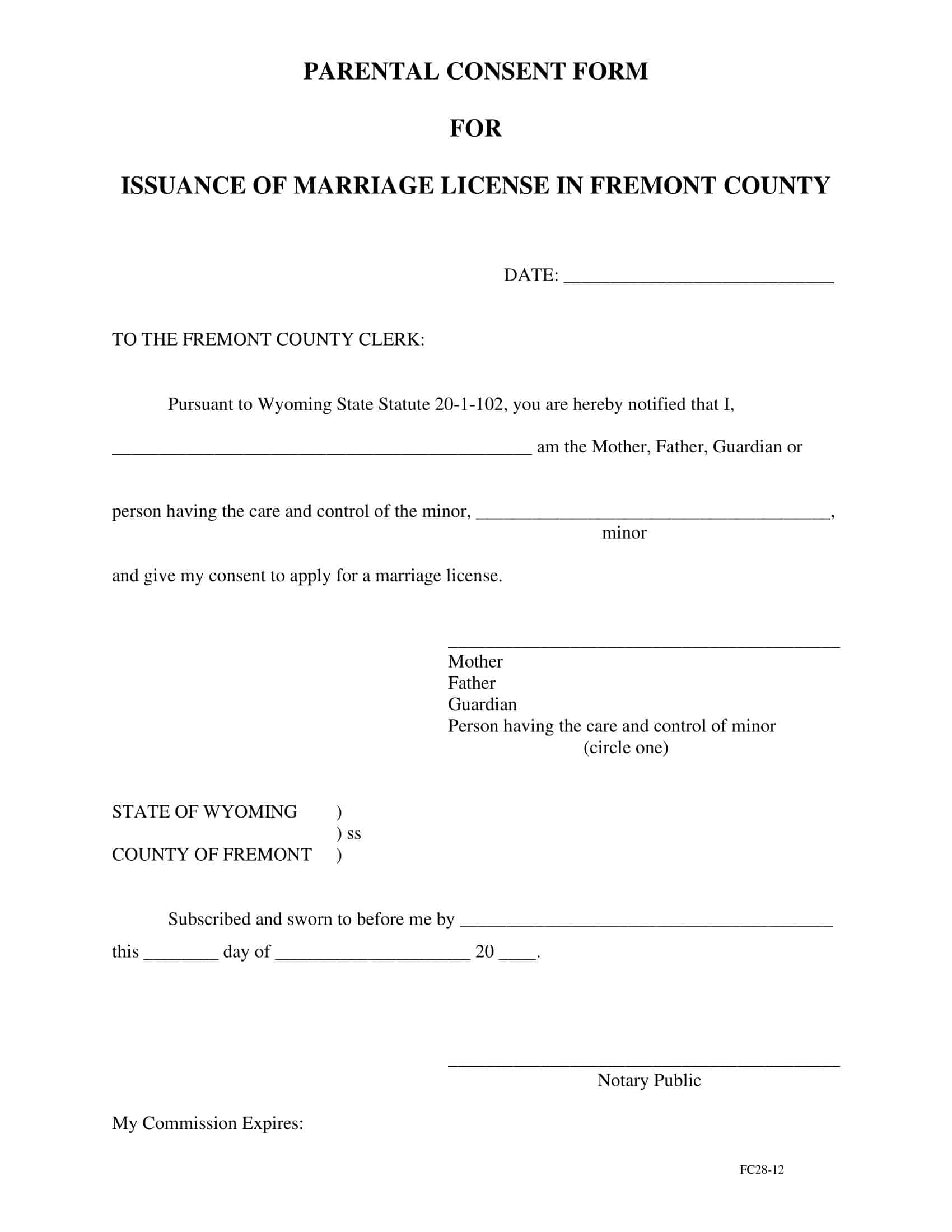




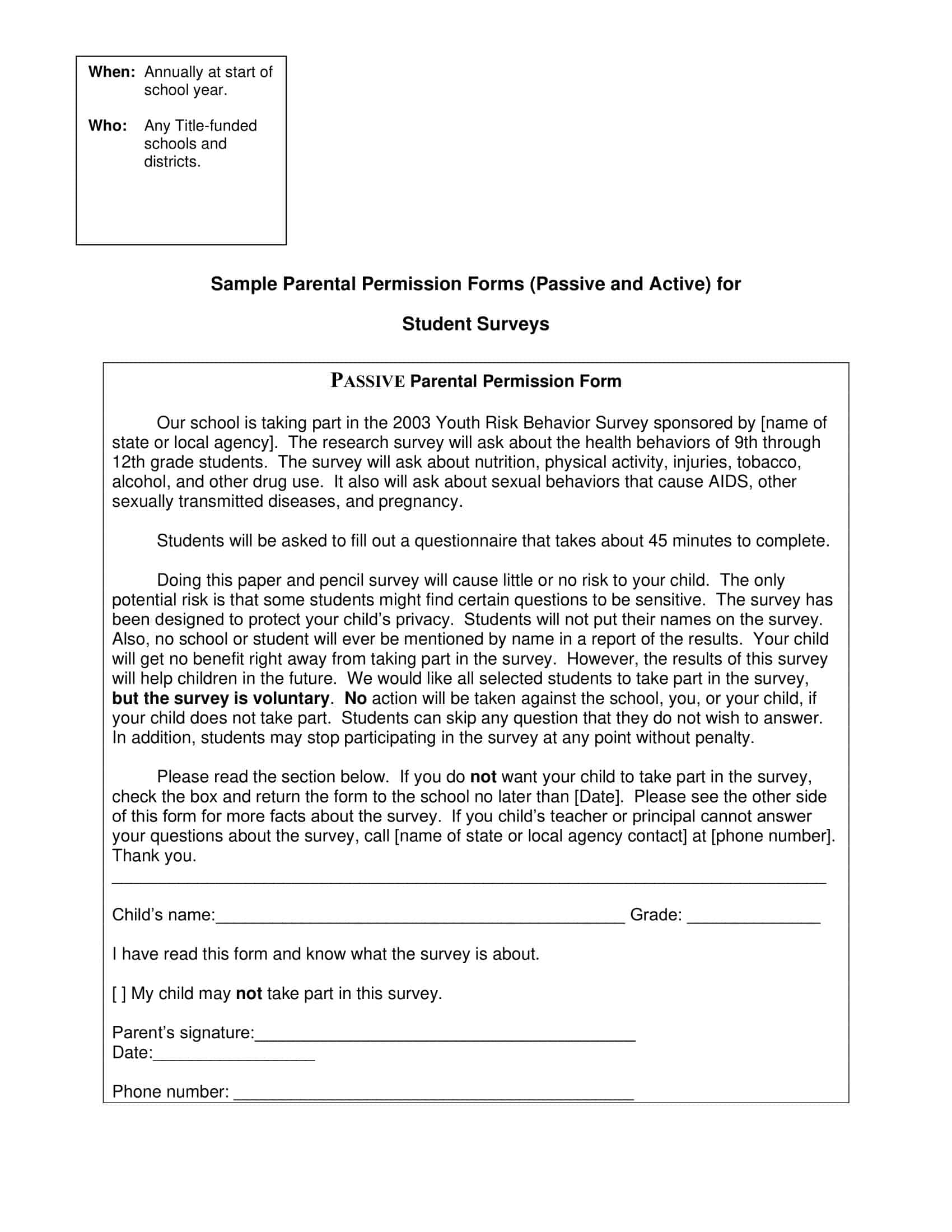











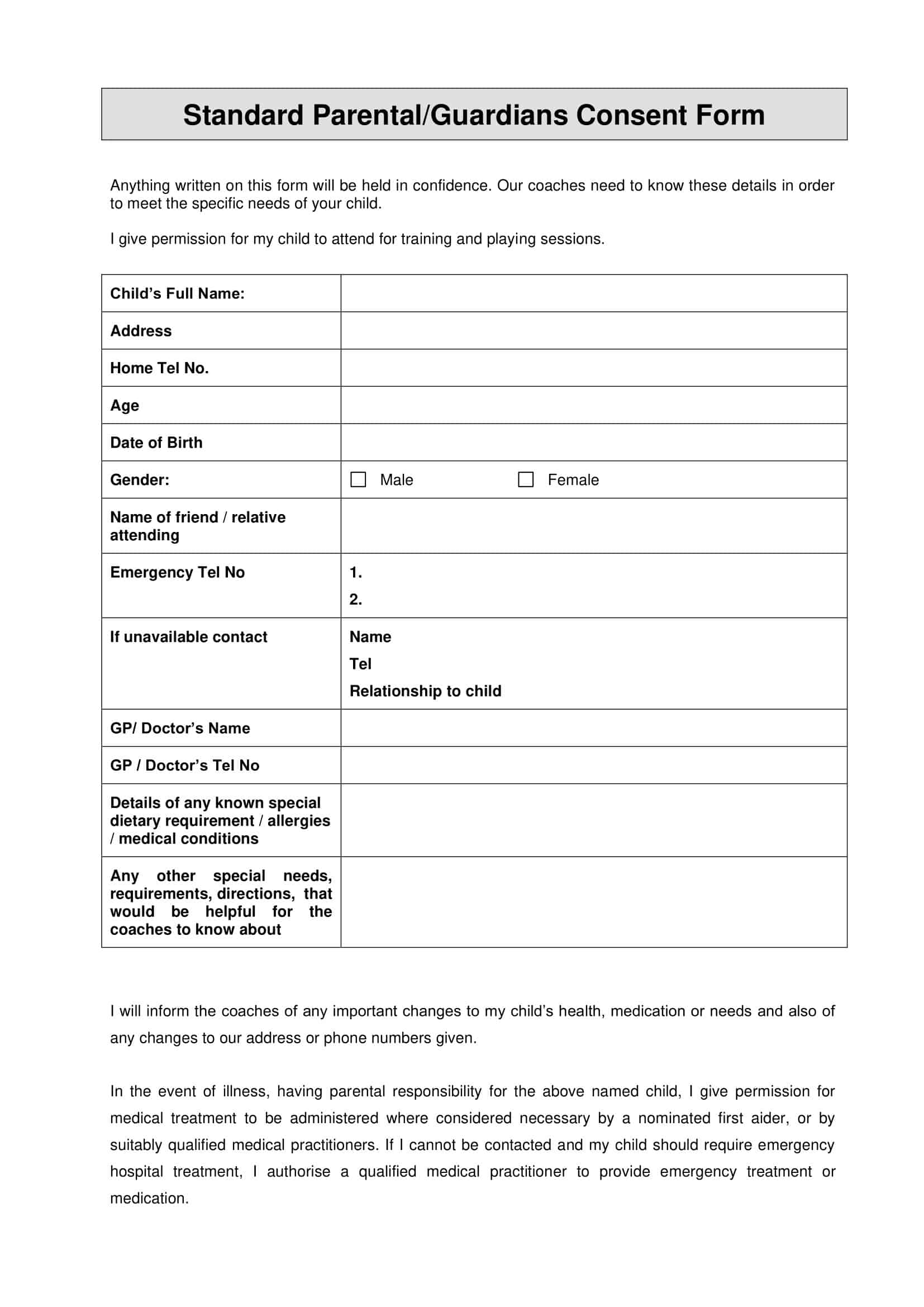


















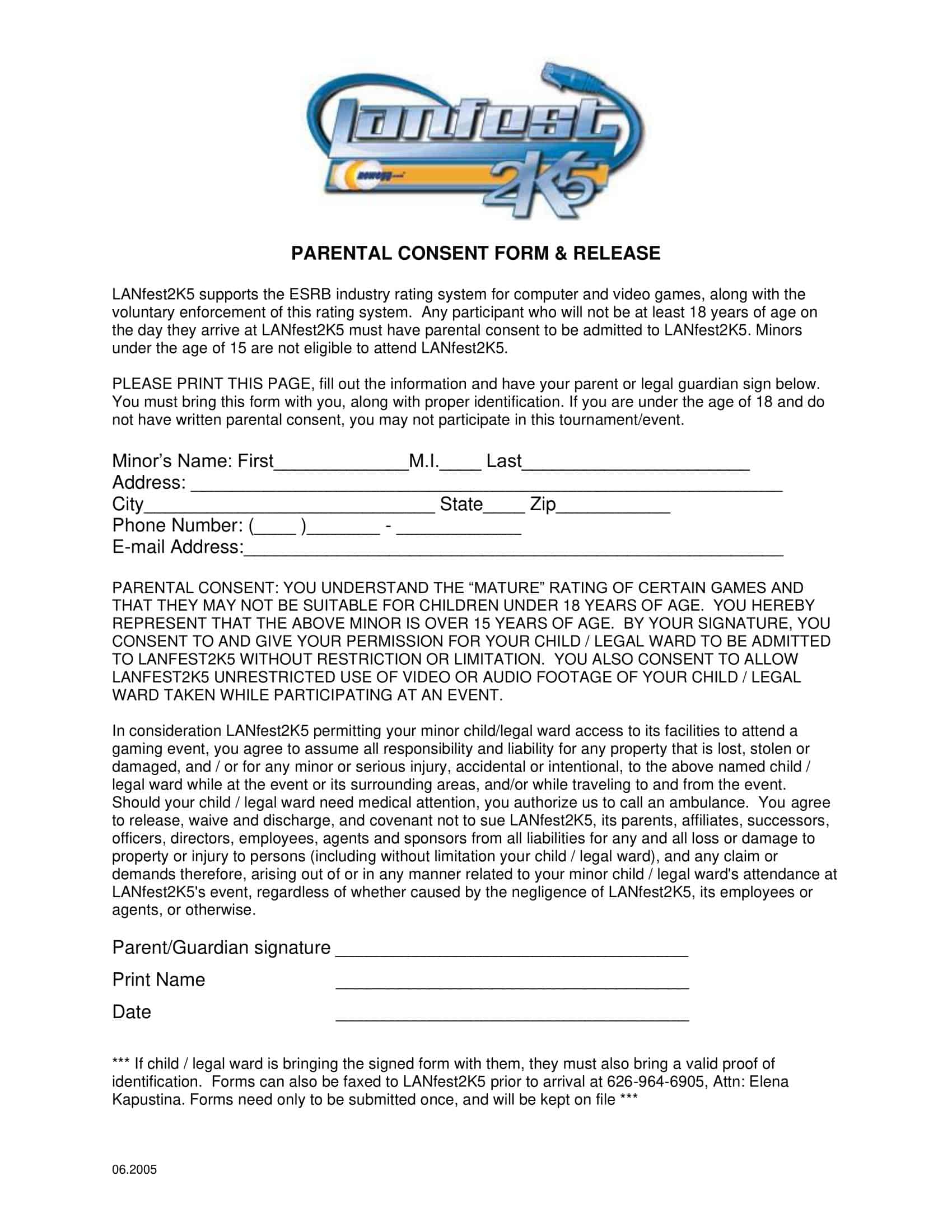

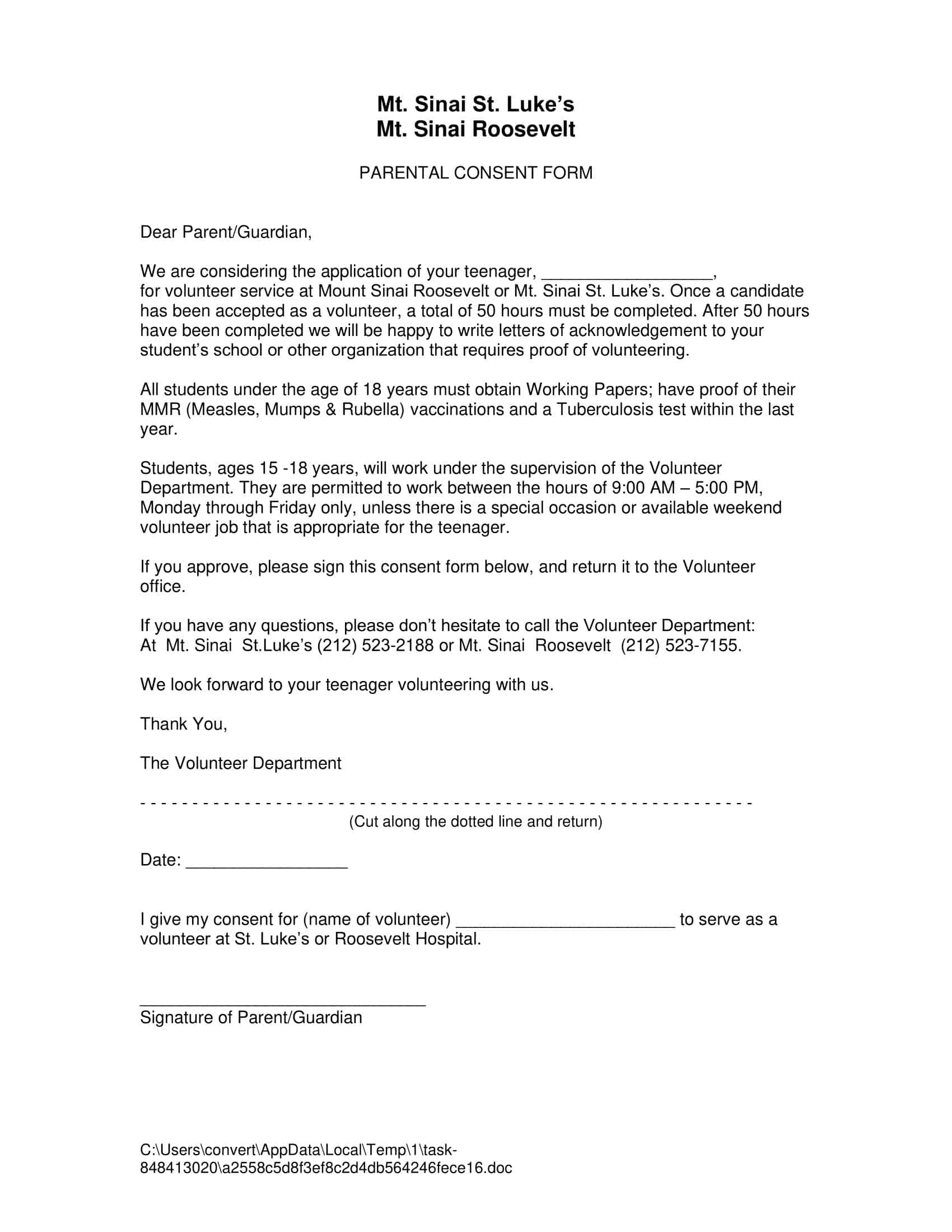










![Free Printable Location Release Form Templates [PDF, Word] Property / Example 1 Location Release Form](https://www.typecalendar.com/wp-content/uploads/2023/05/Location-Release-Form-1-150x150.jpg)
![Free Printable Talent Release Form Templates [PDF, Word, Excel] 2 Talent Release Form](https://www.typecalendar.com/wp-content/uploads/2023/05/Talent-Release-Form-1-150x150.jpg)
![Free Printable Roommate Agreement Templates [Word, PDF] 3 Roommate Agreement](https://www.typecalendar.com/wp-content/uploads/2023/06/Roommate-Agreement-150x150.jpg)
